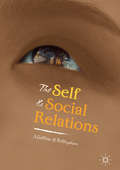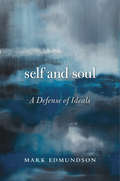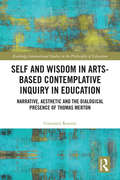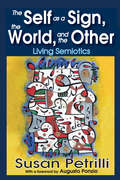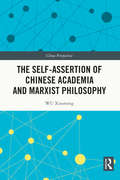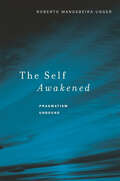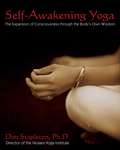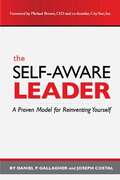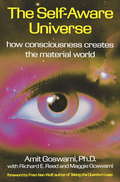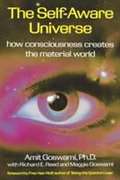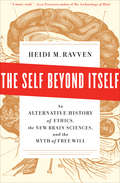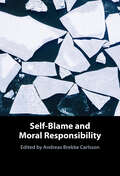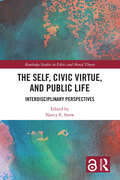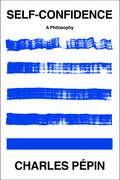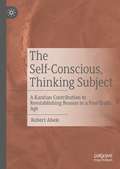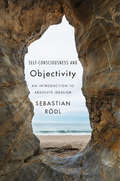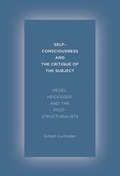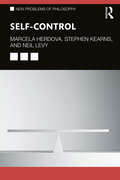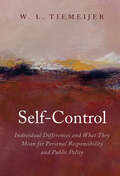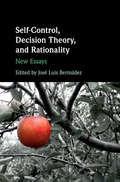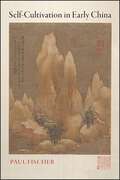- Table View
- List View
The Self and Social Relations
by Matthew WhittinghamThis book is concerned with the human individual and her relationship with the communities of which she is a member. It argues against the traditional atomistic view that individuals are essentially independent of the social relations into which they enter, and instead argues for the holistic view that we are essentially social beings who cannot exist apart from normative communities. Matthew Whittingham engages in a sustained exploration and criticism of the classic Western picture of epistemology. He argues instead that communities ground the possibility of our forming a conception of the world and ourselves, that those social relations open up a range of affective responses and forms of action that would otherwise be impossible, they enable us to know and reason about the world, and they make possible the daily struggles for freedom and self-realization that are familiar to us all and find their most powerful expression in major social movements.
Self and Soul: A Defense of Ideals
by Mark EdmundsonIn a culture of the Self that has become progressively more skeptical and materialistic, we spare little thought for the great ideals--courage, contemplation, and compassion--that once gave life meaning. Here, Mark Edmundson makes an impassioned attempt to defend the value of these ancient ideals and to resurrect Soul in the modern world.
Self and Soul: A Defense of Ideals
by Mark EdmundsonIn a culture that has become progressively more skeptical and materialistic, the desires of the individual self stand supreme, Mark Edmundson says. We spare little thought for the great ideals that once gave life meaning and worth. Self and Soul is an impassioned effort to defend the values of the Soul. Edmundson guides readers back to the ancient sources of the three great ideals: courage, contemplation, and compassion. Homerâe(tm)s Iliad presents two contrasting versions of the heroic ideal: Achilles, who risks everything to become the greatest of warriors, and Hector, who sacrifices his life to defend his people. Platoâe(tm)s quest is for timeless truth: he is the prime example of the authentic thinker, concentrating the ideal of contemplation. The third great ideal, compassion, is embodied by Jesus, the Buddha, and Confucius, who taught loving kindness, forgiveness, and forbearance in a world where such qualities are difficult and sometimes dangerous to espouse. Shakespeare and Freud are the modern worldâe(tm)s great enemies of these ideals, Edmundson argues. Shakespeare detests chivalry and has little time for faith and philosophy. Freud sees ideals as illusions that will inevitably betray us. But between them, a new ideal arises: imaginative creation, exemplified by Blake and Shelley. Self and Soul is, as Edmundson provocatively writes, an attempt to resurrect Soul in the modern world.
Self and Wisdom in Arts-Based Contemplative Inquiry in Education: Narrative, Aesthetic and the Dialogical Presence of Thomas Merton (Routledge International Studies in the Philosophy of Education)
by Giovanni RossiniBy foregrounding a first-person perspective, this text enacts and explores self-reflection as a mode of inquiry in educational research and highlights the centrality of the individual researcher in the construction of knowledge. Engaging in particular with the work of Thomas Merton through a dialogical approach to his writings, Self and Wisdom in Arts-Based Contemplative Inquiry in Education offers rich examples of personal engagement with text and art to illustrate the pervasive influence of the personal in reflective, narrative, and aesthetic forms of inquiry. Chapters consider methodological and philosophical implications of self-study and contemplative research in educational contexts, and show how dialogic approaches can enrich empirical forms of inquiry, and inform pedagogical practice. In its embrace of a contemplative voice within an academic treatise, the text offers a rich example of arts-based contemplative inquiry. This unique text will be of interest to postgraduate scholars, researchers, and academics working in the fields of educational philosophy, arts-based and qualitative research methodologies and Merton studies.
The Self as a Sign, the World, and the Other: Living Semiotics
by Susan PetrilliOstentation of the Subject is a practice that is asserting itself ever more in today's world. Consequently, criticism by philosophers, psychologists, sociologists, and anthropologists has been to little effect, considering that they are not immune to such practices themselves. The question of subjectivity concerns the close and the distant, the self and the other, the other from self and the other of self. It is thus connected to the question of the sign. It calls for a semiotic approach because the self is itself a sign; its very own relation with itself is a relation among signs. This book commits to developing a critique of subjectivity in terms of the material that the self is made of, that is, the material of signs.Susan Petrilli highlights the scholarship of Charles Peirce, Mikhail Bakhtin, Roland Barthes, Mary Boole, Jacques Derrida, Michael Foucault, Emmanuel Levinas, Claude Levi-Strauss, Maurice Merleau-Ponty, Charles Morris, Thomas Sebeok, Thomas Szasz, and Victoria Welby. Included are American and European theories and theorists, evidencing the relationships interconnecting American, Italian, French, and German scholarship.Petrilli covers topics from identity issues that are part of semiotic views, to the corporeal self as well as responsibility, reason, and freedom. Her book should be read by philosophers, semioticians, and other social scientists.
The Self-assertion of Chinese Academia and Marxist Philosophy (China Perspectives)
by WU XiaomingFrom a Marxist philosophical perspective, this collection of essays investigates the maturing self-consciousness and self-assertion of Chinese academia, especially within the humanities and social sciences, permitting more penetrating insights and critical engagement with the social reality of China.The author elaborates on the relationship between Hegel and Marx’s philosophy and their concepts of reality, thereby accounting for the historic and philosophical conditions for the autonomy of Chinese academia. Drawing on intellectual resources from both Eastern and Western archives, including phenomenology, philosophical hermeneutics, Western Marxism, and China’s pacifist tradition, the book refutes Huntington’s speculation about Chinese imperialism and delineates how China’s development can contribute to a fundamental critique of capitalist civilisation and a new paradigm of global governance. In addition, the book challenges the thinking of Chinese neo-liberals and nationalist-conservatives and their understandings of the history and social reality of China. Hence, the author advocates a reconstruction of the spiritual and intellectual realm within society based on Marxism, in order to counter Sinophobia, neo-liberalism, and nationalism at the same time.The book will appeal to readers interested in social and political philosophy, philosophy of history, Marxism, and China studies.
The Self Awakened: Pragmatism Unbound
by Roberto Mangabeira UngerIn what kind of world and for what kind of thought is time real, history open, and novelty possible? In what kind of world and for what kind of thought does it make sense for a human being to look for trouble rather than to stay out of trouble?In this long-awaited work of general philosophy, Roberto Mangabeira Unger proposes a radical reorientation of established ideas about nature, mind, society, politics, and religion. He shows how we have to change our beliefs if we are to succeed in doing justice to our most distinctive contemporary experiences, discoveries, and ideals.The Self Awakened mobilizes the resources of several philosophical traditions, and develops the unrecognized revolutionary implications of the most influential of these traditions today--pragmatism. Avoiding technical jargon and needless complication, this book makes a case for philosophy as the supreme activity of the intellect at war, insisting on its power to deal with what matters most.
Self-Awakening Yoga: The Expansion of Consciousness through the Body's Own Wisdom
by Don StapletonTakes yoga back to its roots as a creative learning process and an expansion of consciousness, not just a technique for health and fitness • Provides simple techniques that enhance the free flow of prana to promote physical and emotional healing, self-discovery, and spiritual evolution • Includes over 100 exercises and meditations for a self-structured practice • Teaches how to release the body’s inefficient, painful patterns and to access unknown potentials through kinesthetic inquiries When artist and professor Don Stapleton discovered yoga, it marked the beginning of a journey into the awakening powers of prana--the energy of yogic purification--and the natural spiritual and healing properties of his own body. After 30 years of extensive yoga training, an accident left him with a severe injury to the spine. Faced with the challenge of physical recovery, Stapleton drew upon his knowledge of yoga to create a series of exercises that allowed him to recover freedom of movement, release emotional blockages, and unleash his spiritual and physical potential. Self-Awakening Yoga is the synthesis of Stapleton’s practice. More than 100 exercises--from focusing on the breath to accessing primal sound--show how to unlock the wisdom and power of prana to engage the body’s healing powers. His simple exercises and meditations focus on natural movements that encourage body awareness. Readers learn how to listen to what the body is saying before engaging in any specific yoga postures. Self-Awakening Yoga takes yoga back to its roots as a creative learning process and an expansion of consciousness, not just a technique for health and fitness.
The Self-aware Leader: A Proven Model For Reinventing Yourself
by Daniel P. Gallagher Joseph CostalThe Self-Aware Leader provides practical and proven lessons on how becoming more self-aware within the context of your management practices will benefit you, your career, and your organization. Based on research by the author, it offers insights regarding those aspects of your management career about which you need to become self-aware, and which characteristics drive desirable leadership outcomes such as achieving success with projects, promotions, and professional satisfaction. Some of the specific topics discussed in The Self-Aware Leader include: defining the advantages of self-awareness in leadership specific lessons on how to become a self-aware leader guidance on how to successfully reinvent self, others, and the business applying your self-awareness to the task of day-to-day management the importance and value of profitable imagination in leadership how thinking like a general manager can yield benefits to you and your organization the power of Generosity QuotientTM and professional authenticity as leadership practices how to put these lessons together by “connecting the dots” to boost innovation and success. The Self-Aware Leader delivers a proven program to increased success for both you and your organization by outlining a path to greater managerial self-awareness. With its specific, experience-based insights for managers, The Self-Aware Leader is an extremely valuable resource for anyone interested in increasing their leadership skill set and furthering their managerial career.
The Self-Aware Universe
by Amit GoswamiConsciousness, not matter, is the ground of all existence, declares University of Oregon physicist Goswami, echoing the mystic sages of his native India. He holds that the universe is self-aware, and that consciousness creates the physical world.
The Self-Aware Universe: How Consciousness Creates the Material World
by Amit Goswami Richard E. Reed Maggie GoswamiBrings together the most recent discoveries in quantum physics and provides a powerful argument for transforming not only the way we view nature, but also how we view our own personal reality. This book challenges readers to give up their prejudices regarding material realism, to open ourselves up to the new language and new concepts that have paralleled the growth of quantum physics, and to accept the revelation that an object and the thought of an object are both products of consciousness.
Self-Awareness in Islamic Philosophy
by Jari KaukuaThis important book investigates the emergence and development of a distinct concept of self-awareness in post-classical, pre-modern Islamic philosophy. Jari Kaukua presents the first extended analysis of Avicenna's arguments on self-awareness - including the flying man, the argument from the unity of experience, the argument against reflection models of self-awareness, and the argument from personal identity - arguing that all these arguments hinge on a clearly definable concept of self-awareness as pure first-personality. He substantiates his interpretation with an analysis of Suhrawardī's use of Avicenna's concept and Mullā Sadrā's revision of the underlying concept of selfhood. The study explores evidence for a sustained, pre-modern and non-Western discussion of selfhood and self-awareness, challenging the idea that these concepts are distinctly modern, European concerns. The book will be of interest to a range of readers in history of philosophy, history of ideas, Islamic studies, and philosophy of mind.
The Self Beyond Itself: An Alternative History of Ethics, the New Brain Sciences, and the Myth of Free Will
by Heidi M. Ravven&“Intertwines history, philosophy, and science . . . A powerful challenge to conventional notions of individual responsibility&” (Publishers Weekly). Few concepts are more unshakable in our culture than free will, the idea that individuals are fundamentally in control of the decisions they make, good or bad. And yet the latest research about how the brain functions seems to point in the opposite direction . . . In a work of breathtaking intellectual sweep and erudition, Heidi M. Ravven offers a riveting and accessible review of cutting-edge neuroscientific research into the brain&’s capacity for decision-making—from &“mirror&” neurons and &“self-mapping&” to surprising new understandings of group psychology. The Self Beyond Itself also introduces readers to a rich, alternative philosophical tradition of ethics, rooted in the writing of Baruch Spinoza, that finds uncanny confirmation in modern science. Illustrating the results of today&’s research with real-life examples, taking readers from elementary school classrooms to Nazi concentration camps, Ravven demonstrates that it is possible to build a theory of ethics that doesn&’t rely on free will yet still holds both individuals and groups responsible for the decisions that help create a good society. The Self Beyond Itself is that rare book that injects new ideas into an old debate—and &“an important contribution to the development of our thinking about morality&” (Washington Independent Review of Books). &“An intellectual hand-grenade . . . A magisterial survey of how contemporary neuroscience supports a vision of human morality which puts it squarely on the same plane as other natural phenomena.&” —William D. Casebeer, author of Natural Ethical Facts
Self-Blame and Moral Responsibility
by Andreas Brekke CarlssonSelf-blame is an integral part of our lives. We often blame ourselves for our failings and experience familiar unpleasant emotions such as guilt, shame, regret, or remorse. Self-blame is also what we often aim for when we blame others: we want the people we blame to recognize their wrongdoing and blame themselves for it. Moreover, self-blame is typically considered a necessary condition for forgiveness. However, until now, self-blame has not been an integral part of the theoretical debate on moral responsibility. This volume presents twelve new essays by leading moral philosophers, who set out bold new theories of the nature and ethics of self-blame, and the interconnection between self-blame and moral responsibility. The essays cast new light on traditional problems in the debate on moral responsibility and open new, exciting avenues for research in moral philosophy, moral psychology and the philosophy of punishment.
The Self, Civic Virtue, and Public Life: Interdisciplinary Perspectives (Routledge Studies in Ethics and Moral Theory)
by Nancy E. SnowThis volume showcases new and interesting ways in which the possession of civic virtues can contribute to people’s abilities to engage in public life in meaningful ways.What is the role of civic virtues in public life? How does possessing civic virtues affect persons and their capacities for participation in the public order? The chapters in this volume combine philosophical and empirically informed work to show how civic virtues can be informed by larger virtue ethical perspectives. The first two chapters discuss virtues of individuals that have not received significant empirical attention—authenticity and wisdom and psychological resilience. The next two chapters address education and the ways in which civic virtues can help us to better serve schoolchildren who are socially and economically disadvantaged, as well as to broaden students’ horizons with respect to character and sustainability education. The final four chapters explore the roles for virtues within various political and public realms. They offer perspectives on how virtues affect contentious politics in democratic societies, and study virtues in contexts in which democracy has been stifled or torn apart by war. Together, the chapters highlight the ever-widening impact of the virtues on our lives and in society.The Self, Civic Virtue, and Public Life will be of interest to scholars and graduate students working in ethics, political philosophy, psychology, and philosophy of education.The Open Access version of this book, available at www.taylorfrancis.com, has been made available under a Creative Commons Attribution-Non Commercial-No Derivatives (CC-BY-NC-ND) 4.0 International license.
Self-Confidence: A Philosophy
by Charles PépinInspired by great figures from Emerson and Nietzsche to Madonna and Serena Williams, this engaging philosophical essay explores the workings of self-confidence and how to develop it. Where does self-confidence come from? How does it work? What makes it stronger or weaker? Why are some people more confident than others? Is it only a question of temperament or the result of conscious self-improvement? How do you get closer to those who stand out thanks entirely to their confidence in themselves? Drawing on philosophical texts, ancient wisdom, positive psychology, and a wide range of case studies that feature famous thinkers, artists, and athletes, but also unsung heroes such as a fighter pilot and an urgent-care doctor, Charles Pépin brings to light the strange alchemy that is self-confidence. In doing so, he gives us the keys to having more confidence in ourselves.
The Self-Conscious, Thinking Subject: A Kantian Contribution to Reestablishing Reason in a Post-Truth Age
by Robert AbeleThis book argues that the primary function of human thinking in language is to make judgments, which are logical-normative connections of concepts. Robert Abele points out that this presupposes cognitive conditions that cannot be accounted for by empirical-linguistic analyses of language content or social conditions alone. Judgments rather assume both reason and a unified subject, and this requires recognition of a Kantian-type of transcendental dimension to them. Judgments are related to perception in that both are syntheses, defined as the unity of representations according to a rule/form. Perceptual syntheses are simultaneously pre-linguistic and proto-rational, and the understanding (Kant’s Verstand) makes these syntheses conceptually and thus self-consciously explicit. Abele concludes with a transcendental critique of postmodernism and what its deflationary view of ontological categories—such as the unified and reasoning subject—has done to political thinking. He presents an alternative that calls for a return to normativity and a recognition of reason, objectivity, and the universality of principles.
Self-Consciousness and Objectivity: An Introduction to Absolute Idealism
by Sebastian RödlSebastian Rödl undermines a foundational dogma of contemporary philosophy: that knowledge, in order to be objective, must be knowledge of something that is as it is, independent of being known to be so. This profound work revives the thought that knowledge, precisely on account of being objective, is self-knowledge: knowledge knowing itself.
Self-Consciousness and the Critique of the Subject: Hegel, Heidegger, and the Poststructuralists
by Simon LumsdenPoststructuralists hold Hegel responsible for giving rise to many of modern philosophy's problematic concepts—the authority of reason, self-consciousness, the knowing subject. Yet, according to Simon Lumsden, this animosity is rooted in a fundamental misunderstanding of Hegel's thought, and resolving this tension can not only heal the rift between poststructuralism and German idealism but also point these traditions in exciting new directions. Revisiting the philosopher's key texts, Lumsden calls attention to Hegel's reformulation of liberal and Cartesian conceptions of subjectivity, identifying a critical though unrecognized continuity between poststructuralism and German idealism. Poststructuralism forged its identity in opposition to idealist subjectivity; however, Lumsden argues this model is not found in Hegel's texts but in an uncritical acceptance of Heidegger's characterization of Hegel and Fichte as "metaphysicians of subjectivity." Recasting Hegel as both post-Kantian and postmetaphysical, Lumsden sheds new light on this complex philosopher while revealing the surprising affinities between two supposedly antithetical modes of thought.
Self-Consciousness and the Critique of the Subject: Hegel, Heidegger, and the Poststructuralists
by Simon LumsdenRevisiting the philosopher's key texts, Lumsden calls attention to Hegel's reformulation of liberal and Cartesian conceptions of subjectivity, identifying a critical though unrecognized continuity between poststructuralism and German idealism
Self-Consciousness and the Critique of the Subject: Hegel, Heidegger, and the Poststructuralists
by Simon LumsdenRevisiting the philosopher's key texts, Lumsden calls attention to Hegel's reformulation of liberal and Cartesian conceptions of subjectivity, identifying a critical though unrecognized continuity between poststructuralism and German idealism
Self-Control: Perspectives From Philosophy, Psychology, And Neuroscience (New Problems of Philosophy)
by Marcela Herdova Stephen Kearns Neil LevySelf-control is a fundamental part of what it is to be a human being. It poses important philosophical and psychological questions about the nature of belief, motivation, judgment, and decision making. More immediately, failures of self-control can have high costs, resulting in ill-health, loss of relationships, and even violence and death, whereas strong self-control is also often associated with having a virtuous character. What exactly is self-control? If we lose control can we still be free? Can we be held responsible for loss of self-control? In this thorough and clearly written introduction to the philosophy of self-control the authors examine and assess the following topics and questions: The importance of self-control What is self-control? Self-control and the law of desire Mechanisms of self-control How is it possible to lose self-control? Blameworthiness and (the loss of) self-control Externalist self-control Pathologies of self-control. Combining philosophical analysis with surveys of the latest psychological research, and including chapter summaries, suggestions for further reading, and a glossary of key terms, Self-Control is essential reading for students of philosophy of mind and psychology, moral psychology, free will, and ethics. It will also be of interest to those in related fields such as psychology and cognitive science.
Self-Control: Individual Differences and What They Mean for Personal Responsibility and Public Policy
by W. L. TiemeijerGood self-control is a crucial factor in the distribution of life outcomes, ranging from success at school and work, to good mental and physical health, and to satisfying romantic relationships. While in the last decades psychologists have learned much about this all-important trait, both social theory and politics have not caught up. Many academics and policymakers still seem to believe that everybody has unlimited capacity for self-control and that maintaining discipline is purely a matter of volition. This book shows that such beliefs are fundamentally mistaken. It presents the state-of-the-art in research on self-control, explains why this trait has been largely overlooked, and sets out the profound implications of this psychological research for moral responsibility, distributive justice and public policy. It shows that the growing emphasis in politics on 'personal responsibility' is deeply problematic, and outlines alternatives more in accord with human psychology.
Self-Control, Decision Theory, and Rationality: New Essays
by José Luis BermúdezThinking about self-control takes us to the heart of practical decision-making, human agency, motivation, and rational choice. Psychologists, philosophers, and decision theorists have all brought valuable insights and perspectives on how to model self-control, on different mechanisms for achieving and strengthening self-control, and on how self-control fits into the overall cognitive and affective economy. Yet these different literatures have remained relatively insulated from each other. Self-Control, Decision Theory, and Rationality brings them into dialog by focusing on the theme of rationality. It contains eleven newly written essays by a distinguished group of philosophers, psychologists, and decision theorists, together with a substantial introduction, collectively offering state-of-the-art perspectives on the rationality of self-control and the different mechanisms for achieving it.
Self-Cultivation in Early China (SUNY series in Chinese Philosophy and Culture)
by Paul FischerSelf-Cultivation in Early China is an introduction to multiple aspects of the foundational practice of self-cultivation in early China (c.1000 to 100 BCE). Drawing on the Chinese classics and the dozens of scholars' texts (both received and excavated) that together form the basis of intellectual history for China and all of East Asia, the book's analysis relies on the topics and categories that were central to the thought of these authors, including such well-known thinkers as Confucius and Laozi. This book describes a salient point of view from which we may consider the broader landscape of Chinese intellectual history and presents an important paradigm of the scholarly Chinese worldview that is ideal for comparison with paradigms in other communities, ancient or modern, across the globe.
